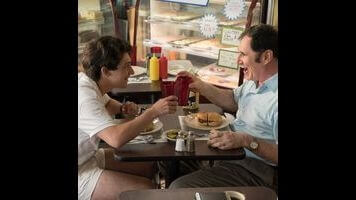Judy, David, and Sam celebrate Sam’s 56th birthday at a Hibachi joint, where the Asian stereotypes are purposefully outsized, partially to parody how bad cultures that are not of the white variety were portrayed onscreen in 1980s, and partially so they can be contrasted for comedy later. “I can’t tell white people apart,” the annoyed hostess says to Sam and David as they try to find the mysterious humpback whale whiskey — served by the man with the long skinny mustache, whose mere look should make anyone uncomfortable by 2015 standards — that begins their body swap. A couple shots begin their journey: Sam becomes David and David becomes Sam.
The only problem is that David gets a lot of insight into his father, while Sam doesn’t learn all that much about David other than the fact that he can eat a lot and he doesn’t have constant acid reflux. David-as-Sam learns more about his parents failing marriage, which he could see to some degree, but more importantly about his father’s failing business. He gets to see the burden that Sam carries on a regular basis, if only because there’s an H&R block moving in across the street. He also gets to learn about his mother, even in small way. She feels invisible, unappreciated, something David-as-Sam can only sheepishly disagree with because he truly does appreciate her, yet it doesn’t mean that Judy experiences it. What he sees as appreciation, she doesn’t feel at all. But Sam-as-David doesn’t learn anything about Sam. He has no idea what deal Sam has with Getty, or the romantic tumult involved in his Karen-Skye love triangle. Sam-as-David never gets the benefit of the proverbial therapy session.
Then again, it’s interesting that the fever dream is kept vague. Whose was it? Who experienced this body swap and who will learn from it? Did it happen happen at all? Judy is wearing the pink nightie from the fever dream, but does she wear that every night? There’s this great little father-son moment at the end of the episode, so initially either of them could have experienced the swap. But it’s David who seems to have any action come from it (not to mention, the show is from his perspective). He ends the episode by handing off his class choices to the mailman, seemingly sealing his fate of going his own way or taking accounting.
The draw of “Body Swap” is the performances. Craig Roberts plays Sam big and broad, all hunched over and loud. He’s just happy to be here. But it’s Richard Kind who is particularly fantastic. He seems to grow smaller while embodying David, his face constantly contorted into this look of disgust. It’s much subtler, and therefore it takes longer for it to sink in, but it’s particularly fine work from a consistently beloved character actor.

 Keep scrolling for more great stories.
Keep scrolling for more great stories.
